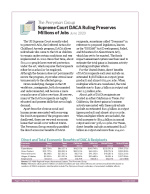Supreme Court DACA Ruling Preserves Millions of Jobs
Published on June 23, 2020

The US Supreme Court recently ruled to preserve DACA, the Deferred Action for Childhood Arrivals program. DACA allows individuals who came to the US as children to remain under certain conditions and was implemented in 2012. Since that time, about 800,000 people have received protection under the act, which requires that recipients either be in school or be employed. Although the decision does not permanently secure the program, it provides critical near-term security to the affected group.
Given underlying changes in the US workforce, immigrants, both documented and undocumented, will become a more crucial source of labor over time. Moreover, many of the DACA recipients are highly educated and possess skills that are in high demand.
Apart from the obvious social and human issues associated with removing the DACA recipients if the program were disallowed, there are very real economic losses that would occur without DACA. The Perryman Group recently quantified the direct economic benefits of DACA recipients, sometimes called "Dreamers" in reference to proposed legislation, known as the "DREAM" Act (Development, Relief, and Education for Alien Minors Act), which has yet to be enacted. The firm's impact assessment system was then used to estimate the total gains in business activity including multiplier effects.
Although the issues related to immigration are complex, economic benefits of this magnitude should not be ignored in the conversation regarding immigration reform. The immigrant workforce is critical to long-term prosperity, particularly given the aging of the population and slowing of workforce growth. While the COVID-19 pandemic has created a temporary spike in unemployment, it has not altered the fundamental underlying demographic patterns. For a number of industries, such as construction, worker shortages have been a notable problem. As the economy recovers from the COVID-19 slowing, such shortages will resurface.
The Supreme Court ruling is good news on many levels. Even so, it is crucial that Congress pass meaningful immigration reform. The Supreme Court did not rule that DACA was a legally sound policy, but rather that the case to end it now had not been adequately made. Immigration reform could not only ensure that DACA recipients are protected, but also improve outcomes in other ways. The ruling is a positive step, but the long-term issue is not yet resolved.
For more details please refer to the full brief.
- Tags: California, DACA, Supreme Court, Texas, United States